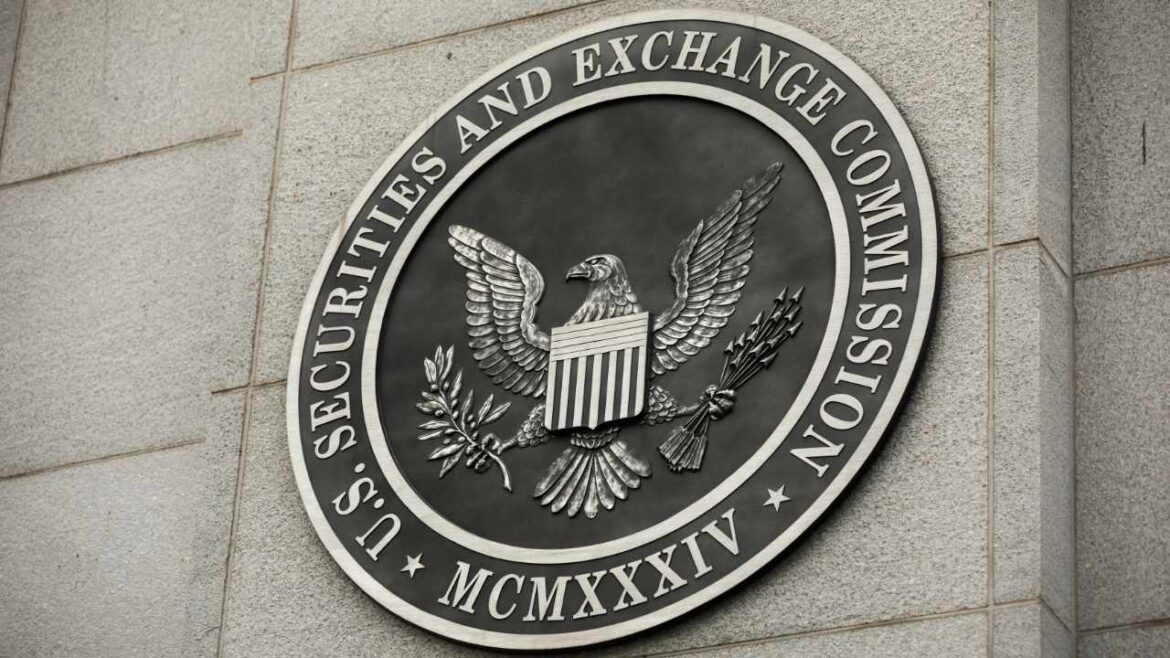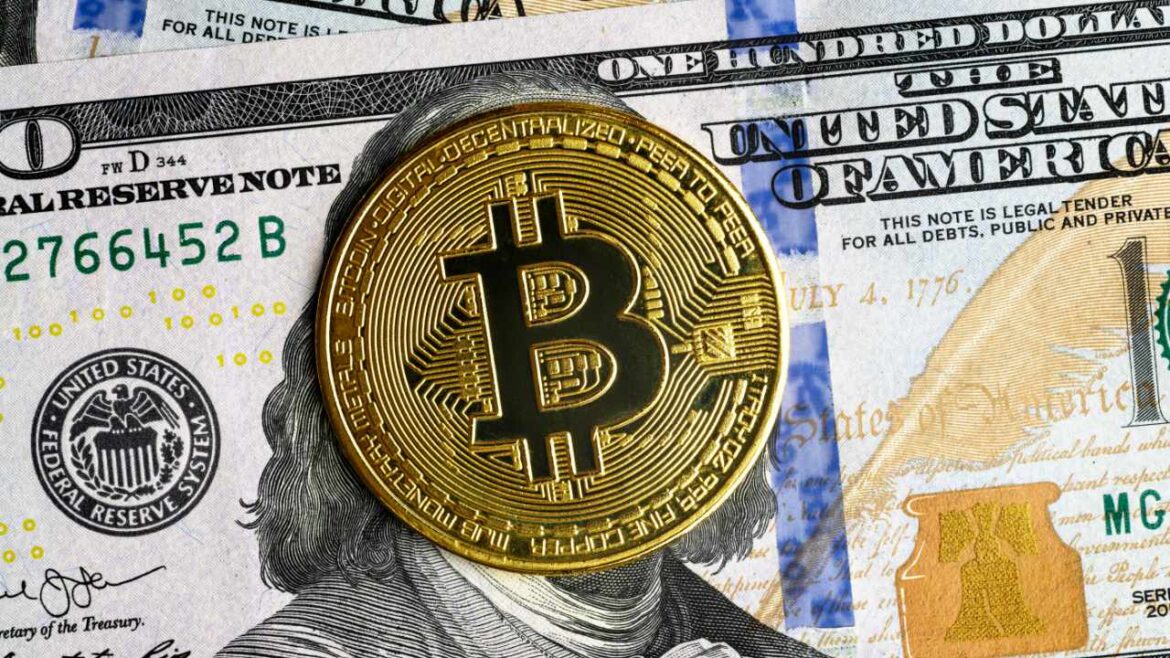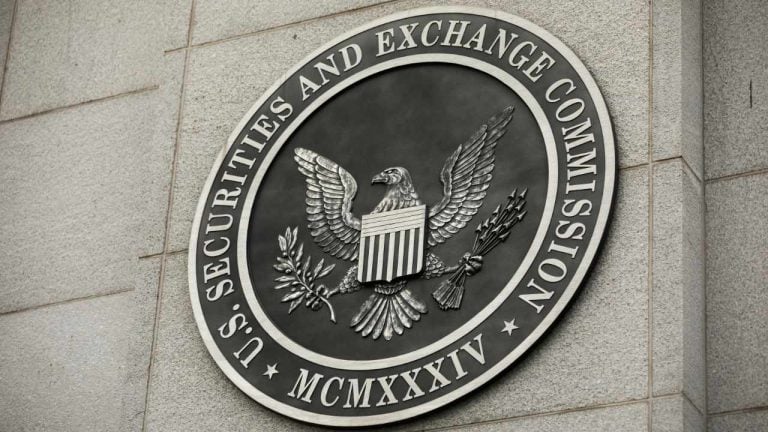 Ripple’s chief legal officer has urged the U.S. Securities and Exchange Commission (SEC) to own up to its multiple missteps in enforcement actions against the crypto industry. He referenced court rulings that criticized the SEC for “gross abuse of power,” lack of “faithful allegiance to the law,” and being “arbitrary and capricious.” Ripple’s Legal Chief […]
Ripple’s chief legal officer has urged the U.S. Securities and Exchange Commission (SEC) to own up to its multiple missteps in enforcement actions against the crypto industry. He referenced court rulings that criticized the SEC for “gross abuse of power,” lack of “faithful allegiance to the law,” and being “arbitrary and capricious.” Ripple’s Legal Chief […]
Source link
urges
Robert Kiyosaki Urges Ditching US Dollar for Bitcoin — Warns Boomers’ Retirements Going Broke as Paper Assets Crash
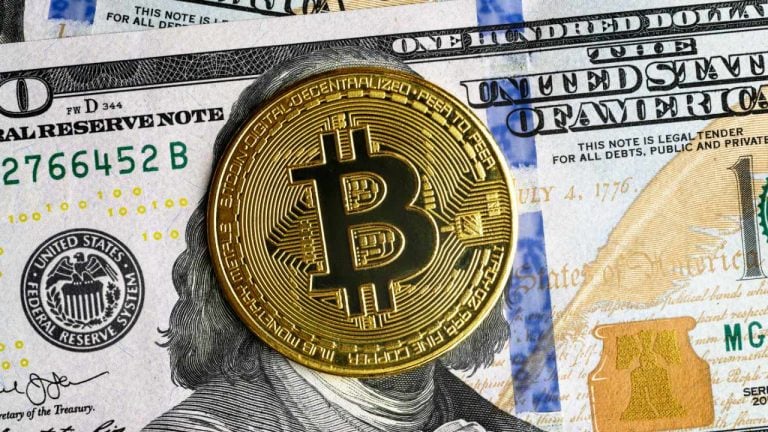 Rich Dad Poor Dad author Robert Kiyosaki has urged investors to ditch the U.S. dollar and buy bitcoin alongside gold and silver. He warned that “baby boomers’ retirements are going broke as paper assets crash.” The famous author stressed: “I do not trust anything that can be printed.” Robert Kiyosaki’s Latest Warnings and Advice The […]
Rich Dad Poor Dad author Robert Kiyosaki has urged investors to ditch the U.S. dollar and buy bitcoin alongside gold and silver. He warned that “baby boomers’ retirements are going broke as paper assets crash.” The famous author stressed: “I do not trust anything that can be printed.” Robert Kiyosaki’s Latest Warnings and Advice The […]
Source link
US Treasury Secretary Janet Yellen Urges Congress To Pass Crypto Legislation
In a recent statement before the House of Representatives, US Treasury Department Secretary Janet Yellen emphasized the need for Congress to pass legislation that provides clarity and regulation in the crypto markets.
Secretary Yellen Calls For Action ‘Digital Asset Risks’
During the Financial Committee hearing, Yellen highlighted the “risks” associated with digital assets and called for measures to address potential vulnerabilities and non-compliance with applicable laws and regulations.
Yellen specifically mentioned concerns related to runs on crypto-asset platforms, stablecoins, and the “proliferation” of platforms acting outside regulatory boundaries.
The Treasury Secretary stressed the importance of enforcing existing rules and regulations while urging Congress to enact legislation specifically targeting stablecoins and “non-securities” crypto assets in the spot market.
Notably, Taylor Barr, head of policy at the blockchain trade association Chamber of Digital Commerce, pointed out that the bipartisan FIT for the 21st Century Act, led by Representative French Hill, aligns with Yellen’s call for market structure and regulation.
Hill, a proponent of the legislative environment for crypto, previously highlighted the progress made in the House of Representatives. He emphasized passing the first comprehensive regulatory framework for digital assets and the prudent approach to stablecoins.
Furthermore, Hill believes that these initiatives address significant “regulatory gaps” and contribute to the crypto industry’s growth.
Pro-Crypto Stance And Legislative Initiatives Align
Barr also commended the Clarity for Payment Stablecoins Act proposed by the Chairman of the US Financial Committee, Patrick McHenry.
This act aims to establish consistent oversight and consumer protection for payment stablecoins, incorporating successful state-level regulations and striking a balance between innovation and regulatory certainty.
McHenry, who has been vocal about the importance of the US leading the financial system of the future, has already emphasized the bipartisan progress on legislation to address the regulatory challenges posed by digital assets.
McHenry called for the “completion of the job,” highlighting the Clarity for Payment Stablecoin Act as a crucial step towards establishing a federal framework for stablecoins.
Overall, the convergence of Secretary Yellen’s call for regulation, Representative Hill’s legislative initiatives, and Chairman McHenry’s pro-crypto stance reflect a growing momentum toward establishing a comprehensive regulatory framework for the crypto industry.
However, it remains to be seen how Secretary Yellen’s proposed regulatory enforcement ideas and proposals will strike a balance between fostering innovation, as emphasized by McHenry and Hill while ensuring the growth of nascent technology.
As discussions on crypto legislation continue, the industry eagerly anticipates the outcome, seeking a regulatory environment that provides clarity and consumer protection and positions the United States at the forefront of digital asset innovation.
Featured image from Shutterstock, chart from TradingView.com
Disclaimer: The article is provided for educational purposes only. It does not represent the opinions of NewsBTC on whether to buy, sell or hold any investments and naturally investing carries risks. You are advised to conduct your own research before making any investment decisions. Use information provided on this website entirely at your own risk.
Boeing urges inspections of 737 Max planes for ‘possible loose bolt’
The Boeing 737 MAX aircraft is displayed at the Farnborough International Airshow, in Farnborough, Britain, July 20, 2022.
Peter Cziborra | Reuters
Boeing is urging airlines to inspect 737 Max planes to look for a “possible loose bolt” in the rudder control system, the latest quality issue to affect the manufacturer’s bestselling jetliner.
The company recommended the inspections after “an international operator discovered a bolt with a missing nut while performing routine maintenance on a mechanism in the rudder-control linkage,” the Federal Aviation Administration said in a statement Thursday. “The company discovered an additional undelivered aircraft with a nut that was not properly tightened.”
The inspections will take about two hours per plane, and all new 737 Maxes will undergo the check before they’re handed over to customers, Boeing said.
“The issue identified on the particular airplane has been remedied,” Boeing said in a statement. “Out of an abundance of caution, we are recommending operators inspect their 737 MAX airplanes and inform us of any findings.
Shares of Boeing were down more than 1% in afternoon trading.
Alaska Airlines plans to start the inspections on Thursday. A spokeswoman said the carrier anticipates completing them in the first half of January. “We don’t expect any operational impact as a result,” she said.
A spokeswoman for United Airlines, one of the biggest 737 Max customers, said the carrier doesn’t expect any impact to its operations as a result of the issue.
American Airlines said in a statement that it will complete the inspections and that it also doesn’t anticipate its operations to be impacted by them.
Don’t miss these stories from CNBC PRO:
Korean central bank governor urges CBDC development to compete with stablecoins

Bank of Korea Governor Chang-yong Rhee warned that the rise of stablecoins could pose a significant threat to the traditional roles of central bank money and impact the effectiveness of monetary policies, local media reported.
Rhee made the statement at a conference on digital money in Seoul on Dec. 15. He added that central banks must step up their efforts to issue both a retail and a wholesale form of central bank digital currency to mitigate this looming threat.
Financial stability concerns
In his keynote speech, Rhee highlighted two main issues central banks must confront.
The first major concern is the rise of stablecoins and the existential threat they pose to central bank money, while the second is the lack of a proper regulatory framework for non-depository or non-financial institutions participating in the digital financial system.
Rhee emphasized that, despite their nomenclature, stablecoins often lack intrinsic stability and could diminish the role of central bank-issued money. This, in turn, could impair the effectiveness of traditional monetary policies.
Further complicating matters is the potential involvement of global networks like Visa or Mastercard, especially for countries like South Korea. This could lead to complexities in managing capital flows and maintaining monetary policy independence, Rhee added.
To address these challenges, Gov. Rhee suggested that central banks consider introducing central bank digital currencies (CBDCs), both in retail and wholesale formats.
He highlighted South Korea’s own efforts in this domain, including a pilot project for a retail CBDC system that leverages distributed ledger technology (DLT). The programmability of such currencies, allowing for complex, conditional transactions through smart contracts, was particularly noted as a significant advantage.
Moreover, the BOK, in collaboration with financial regulators and the Bank for International Settlements, is embarking on a second CBDC pilot project to explore wholesale CBDCs.
The project focuses on integrating a wholesale CBDC with tokenized bank deposits. It aims to explore the issuance of tokenized e-money by banks and non-bank financial institutions fully backed by wholesale CBDCs.
Echoing sentiments
The views of the Bank of Korea align with the sentiments of other major global central banks and financial institutions. For instance, the U.S. Federal Reserve has highlighted the volatility risks associated with stablecoins, especially those collateralized by other cryptocurrencies.
The Fed’s analysis points out the potential for market runs and the amplification of financial instability due to these digital assets. Similarly, the BIS has raised concerns about using stablecoins in cross-border payments.
According to a report by the BIS Committee on Payments and Market Infrastructures, stablecoins could challenge monetary sovereignty and financial stability, and impact seigniorage income. The report also suggests that the benefits of stablecoins could only be realized under stringent design and regulatory frameworks.
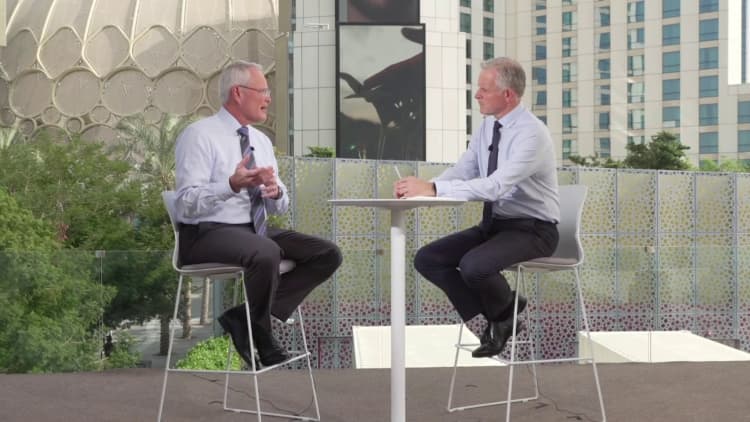
Dubai, UNITED ARAB EMIRATES — Exxon Mobil CEO Darren Woods on Saturday said the “problem statement” that countries need to focus on at the COP28 climate summit is reducing emissions, in contrast to calls for a collective commitment to phase out all fossil fuels.
For many at the summit, which is being held in the United Arab Emirates, COP28 can only be recognized as a success if it results in a deal to “phase out” all fossil fuels, whose burning is the chief driver of the climate crisis.
The language of the final agreement, expected by or around the Dec. 12 end of the conference, will be closely monitored. A “phase out” commitment would likely require a shift away from fossil fuels until their use is eliminated, while a “phase down” could indicate a reduction in their use — but not an absolute end.
There’s also an ongoing debate about whether an agreement should center on “abated” fossil fuels, which are trapped and stocked with carbon capture and storage technologies, or “unabated” fossil fuels, which are largely understood to be produced and used without substantial reductions in the amount of emitted greenhouse gases.
Asked by CNBC’s Steve Sedgwick at COP28 whether it would be the wrong scenario for countries to agree to the phase out of abated fossil fuels, Woods replied, “I think what society ought to focus on is the true problem here, which is emissions.”
“The challenge here is eliminating emissions,” he continued. “How we do that will be a function of where the technology goes, and what the circumstances are, and where those emissions are being emitted.”
‘Keep your mind open’
In a speech delivered to world leaders on Friday, U.N. Secretary-General António Guterres was unequivocal in his call for the burning of fossil fuels to be stopped outright, in order to prevent the worst effects of the climate crisis.
“We cannot save a burning planet with a firehose of fossil fuels,” Guterres said. “The 1.5-degree limit is only possible if we ultimately stop burning all fossil fuels. Not reduce. Not abate. Phaseout — with a clear timeframe aligned with 1.5 degrees.”
Not everyone is on board with calls to phase out fossil fuels, however. Russia has previously said it would oppose this language being used in the final agreement, while COP28 host the United Arab Emirates has instead signaled its preference for a “phase down.”
Darren Woods, chairman and chief executive officer of Exxon Mobil Corp, during the Asia-Pacific Economic Cooperation (APEC) CEO Summit in San Francisco, California, US, on Wednesday, Nov. 15, 2023. Executives from large multinationals are converging on the sidelines of APEC in San Francisco this week for an audience with the Chinese president and other Asian leaders as long-frosty US-China relations show only tentative signs of warming. Photographer: David Paul Morris/Bloomberg via Getty Images
Bloomberg | Bloomberg | Getty Images
“I don’t think there is a one-size fits all. I actually think that part of the thing that has slowed us down is this focus on making a step change and getting out of our existing energy system and starting something brand new. That is going to be a long, costly process that is going to be very, very expensive,” Exxon Mobil’s Woods said.
“Instead, what we ought to be looking at is how do we get from where we’re at today to a future with lower emissions, and that involves step changes in some areas. It certainly involves wind, solar and [electric vehicles], but it also involves decarbonizing what we currently have.”
Woods said that there are currently options to start reducing the carbon intensity of existing technologies “at a much lower cost.”
“So, stay focused on the problem statement of emissions. Keep your mind open to a variety of different solutions and make sure that the work that everybody is putting into this is focused on the areas of strength that we can make the most reduction the quickest,” he added.
Big Oil executives have previously sought to defend their core business model from climate criticism, saying it is not possible to keep everyone happy during the transition away from fossil fuels. Officials of large oil producing nations, including of the UAE, have likewise advocated for the energy security and affordability of using fossil fuels while transitioning toward the exclusive use of green energy.
Tengku Muhammad Taufik, president and group CEO of Malaysia’s state energy firm Petronas, said in early October, “So, the debate has always been posed here, I’m reminded of an old saying: ‘If you want to keep everyone happy, sell ice cream.’ We are not in the business of ice cream — and, I’m reminded, there are people who are lactose intolerant.”
‘Win-win-win’
Asked about criticism the U.S. oil giant has received from climate campaigners over the Pioneer deal, Woods said, “Well, the way we’re looking at this is, there is a demand for oil and gas today, and there will be demand for oil and gas going forward in the future.”
An Exxon Mobil gas station in Washington, DC, US, on Tuesday, Nov. 28, 203.
Bloomberg | Bloomberg | Getty Images
“What exactly that level is, we all have our different views on, but as long as there is demand out there, I think what society wants are the most responsible operators meeting that demand. And what we’re committing to do is [to] be the most responsible operator,” he added.
“We will basically produce more oil at a lower cost, more efficiently with less environmental footprint. That’s a win-win-win. And we’re improving U.S. energy security so there’s a lot to like about that deal,” Woods said.
Ripple lawyer urges fact-check of Gary Gensler’s speech, says SEC actions seen as ‘shady’

As Gary Gensler reiterated the United States Securities and Exchange Commission’s mandate in a speech, Ripple’s lawyer and various crypto community members responded, criticizing the SEC chair and arguing that the commissioner’s words contradict his actions.
On Nov. 16, SEC Chair Gary Gensler shared a video of him conducting a speech at the 2023 Securities Enforcement Forum. In the speech, he highlighted the words of the first SEC chair, Joseph P. Kennedy, saying that the government agency should be “partners of honest business and prosecutors of dishonesty.”
As Joseph P. Kennedy, the first @SECGov Chair, once said: “We are not prosecutors of honest business, nor defenders of crookedness. We are partners of honest business & prosecutors of dishonesty. We shall not prejudge, but we shall investigate.”
Check out my recent remarks: pic.twitter.com/QM2zqj8PQs
— Gary Gensler (@GaryGensler) November 16, 2023
The post on X (formerly Twitter) triggered responses from various crypto community members, including Ripple chief legal officer Stuart Alderoty, who is currently engaged in a legal battle against the SEC. According to Alderoty, the SEC chair’s recent remarks should be fact-checked and that Gensler has “prejudged crypto and has filed suit against others without investigation.”
The SEC is losing in court; being criticized by Judges for shady behavior; being rebuked by the Gov’t’s internal auditor; hiding info about meetings with a felon; becoming irrelevant on the international stage. Gensler – admitting no fault – has become the insulate Col. Jessep. pic.twitter.com/vqjPPcifr8
— Stuart Alderoty (@s_alderoty) November 16, 2023
Alderoty also highlighted that Ripple was sued but was “never charged with dishonesty.” The Ripple executive also threw some accusations toward the SEC and said that they are being criticized for “shady behavior” and are becoming “irrelevant” internationally.
Related: Gary Gensler links crypto with cash in viral 2018 video — Crypto Twitter reacts
Apart from Alderoty, various crypto community members also responded to the video that Gensler shared. Erik Voorhees, founder and CEO of trading platform ShapeShift, responded to the tweet, saying that Gensler has prosecuted his “honest business” twice.
Meanwhile, a community member also responded to Gensler’s remarks, saying that what he quoted “was the vision”; However, the Twitter user argued that it has evolved for the worse, accusing the SEC of facilitating the “legitimization of a corrupt system.”
Magazine: Sam Bankman-Fried convicted, PayPal faces SEC subpoena, and other news: Hodler’s Digest
Coinbase Urges IRS to Reconsider Proposed Tax Rules, Citing Privacy Concerns
Aside from Coinbase has raised concerns about the potential adverse impact of the proposed law across various sectors within the digital asset ecosystem.
The recent proposal from the US Internal Revenue Service (IRS) regarding crypto tax regulations has drawn strong criticism from Coinbase, the largest cryptocurrency exchange in the United States. Expressing deep concern, the exchange emphasized that the proposed IRS rule could pose a significant threat to both the crypto industry and the privacy of American citizens.
In a formal letter addressed to the agency, Lawrence Zlatkin, the vice president of tax at Coinbase Global Inc, emphasized that the proposed rules would lead to an intrusive level of monitoring, burdening both the industry and individuals with complex and onerous reporting requirements.
IRS Proposes New Crypto Rules to Promote Fairness
The proposed regulations in question were introduced by the US Treasury and the Internal Revenue Service in August to oversee the sale and exchange of digital assets by brokers.
Under the proposed rules, newly designated brokers would be required to report digital asset sales and exchanges. With this, the IRS aims to facilitate tax calculations for taxpayers and streamline the process of filing tax returns for digital asset transactions, thereby promoting a fair and consistent approach to tax.
However, Zlatkin argued that these regulations could impede the very growth and progress the IRS seeks to facilitate in the crypto sector.
Coinbase believes the approach is unprecedented, unchecked, and unlimited tracking of the daily lives of Americans. It was said that:
“The proposed regulations, as written, would impose an unprecedented, unchecked, and unlimited tracking on the daily lives of Americans. It would enable government surveillance of Americans’ choices about their most private health care decisions, or even when they purchase a cup of coffee.”
The crypto exchange has called upon the IRS to review the proposal, suggesting a more targeted approach that would streamline reporting requirements and minimize the burden on the broader crypto ecosystem without compromising the goal of ensuring tax compliance.
New IRS Rules Could Stifle Innovation
Aside from Coinbase, the Blockchain Association, a prominent US crypto advocacy group, has raised concerns about the potential adverse impact of the proposed law across various sectors within the digital asset ecosystem. The group warned that the stringent regulations could stifle innovation and growth within the industry.
In contrast to the recent concerns about the negative impact of the proposed laws, a group of Democratic senators, led by Sen. Elizabeth Warren, has urged the IRS to accelerate the implementation of the regulations, emphasizing potential financial losses and the need to ensure compliance among taxpayers.
“Limiting any further delay in the implementation of the Administration’s proposed rule would combat industry efforts to evade regulation, provide clarity to law-abiding taxpayers, and generate billions in tax revenue from a chronically tax-avoidance industry,” Sen. Elizabeth Warren, D-Masss., and others said in a letter dated October 10.
Meanwhile, the deadline for submitting comments to the tax authority is October 30, and a public hearing has been scheduled for November 7.
next
Blockchain News, Cryptocurrency News, News

Chimamanda is a crypto enthusiast and experienced writer focusing on the dynamic world of cryptocurrencies. She joined the industry in 2019 and has since developed an interest in the emerging economy. She combines her passion for blockchain technology with her love for travel and food, bringing a fresh and engaging perspective to her work.
You have successfully joined our subscriber list.
FBI flags 6 Bitcoin wallets linked to North Korea, urges vigilance in crypto firms

The United States Federal Bureau of Investigation (FBI) has flagged six Bitcoin (BTC) wallets linked to North Korean state-backed hacking group Lazarus. The six wallets contain 1,580 BTC worth $40 million believed to be hoarded from various cryptocurrency hacks over the past year.
The FBI in its investigation found that Lazarus Group moved approximately 1,580 BTC linked with several crypto exploits. These funds are currently sitting in the following Bitcoin addresses:
- 3LU8wRu4ZnXP4UM8Yo6kkTiGHM9BubgyiG
- 39idqitN9tYNmq3wYanwg3MitFB5TZCjWu
- 3AAUBbKJorvNhEUFhKnep9YTwmZECxE4Nk
- 3PjNaSeP8GzLjGeu51JR19Q2Lu8W2Te9oc
- 3NbdrezMzAVVfXv5MTQJn4hWqKhYCTCJoB
- 34VXKa5upLWVYMXmgid6bFM4BaQXHxSUoL
The FBI warned crypto companies that the movement of funds linked to the infamous North Korean hacking group could be a sign that they are looking to sell. The federal investigation agency advised crypto companies to keep an eye out for the six BTC wallets and use blockchain data to keep track of any movement of funds.
“Private sector entities should examine the blockchain data associated with these addresses and be vigilant in guarding against transactions directly with, or derived from, the addresses.”
The North Korean hacking group has been actively involved in multiple crypto-linked exploits over the years, stealing billions of dollars worth of crypto assets. A recent report from TRM Labs suggests that the North Korean hackers have stolen nearly $2 billion in crypto since 2018. The group was most active in 2022, having stolen nearly $1 billion worth of crypto assets last year alone.
2022 saw some of the biggest decentralized finance (DeFi) exploits, and Lazarus Group was identified as the mastermind behind Harmony’s Horizon bridge and Sky Mavis’ $625-million hack on Ethereum-linked sidechain Ronin Bridge last year.
Related: ‘Nobody is holding them back’ — North Korean cyber-attack threat rises
Although crypto-linked exploits due to code vulnerabilities in platforms and protocols have increased due to the sophistication in methods used by these hackers, blockchain technology still makes it problematic for exploiters to launder or move their ill-gotten gains due to the public ledger that makes it possible to track the movement of funds.
Law enforcement agencies like the FBI, along with crypto companies, have worked together on several occasions in the past to freeze funds linked to such exploits. Earlier in February this year, Huobi and Binance froze $1.4 million worth of crypto assets linked to North Korea. Similarly, $63 million worth of assets linked to the Harmony Bridge hack was also frozen by crypto exchanges.
Collect this article as an NFT to preserve this moment in history and show your support for independent journalism in the crypto space.
Magazine: Deposit risk: What do crypto exchanges really do with your money?
Ripple legal chief urges investigation into ex-SEC official over Ethereum speech controversy
What is CryptoSlate Alpha?
A web3 membership designed to empower you with cutting-edge insights and knowledge. Learn more ›
Connected to Alpha
Welcome! 👋 You are connected to CryptoSlate Alpha. To manage your wallet connection, click the button below.
Oops…you must lock a minimum of 20,000 ACS
If you don’t have enough, buy ACS on the following exchanges:
Connect via Access Protocol
Access Protocol is a web3 monetization paywall. When users stake ACS, they can access paywalled content. Learn more ›
Disclaimer: By choosing to lock your ACS tokens with CryptoSlate, you accept and recognize that you will be bound by the terms and conditions of your third-party digital wallet provider, as well as any applicable terms and conditions of the Access Foundation. CryptoSlate shall have no responsibility or liability with regard to the provision, access, use, locking, security, integrity, value, or legal status of your ACS Tokens or your digital wallet, including any losses associated with your ACS tokens. It is solely your responsibility to assume the risks associated with locking your ACS tokens with CryptoSlate. For more information, visit our terms page.

